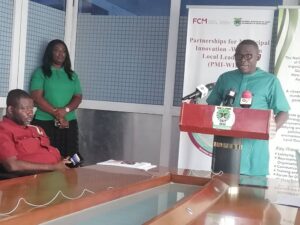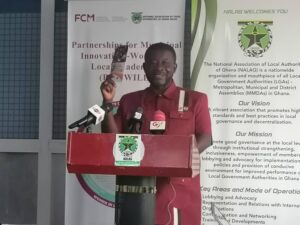The National Association of Local Authorities of Ghana (NALAG), has called on all Ghanaian voters to be deeply involved in the upcoming District Level Elections and vote massively for more women because they are competent to do the job.
NALAG express worries about the number of female Assembly members in the country which is very minimal and nothing to write home about.
” It is time to break the bias and bring more women into our local government system.
This was made known at a press conference presented by Eric Nana Prempeh Agyemang, President of National Association of Local Authorities of Ghana in Accra.
The engagement is in partnership with the Federation of Canadian Municipalities (FCM) as part of the six-year Project Partnership for Municipal Innovation for Women in Local Leadership (PMI-WILL) to make a passionate appeal to Ghanaians of voting age to fully participate in the upcoming District level elections and most importantly, vote massively for more women.

“To increase women participation at the local level of Governance, NALAG has partnered with the Federation of Canadian Municipalities (FCM) to implement the Partnership for Municipal Innovation- Women in Local Leadership (PMI-WILL) project. The six years project is taking place in 5 countries namely Sri Lanka, Cambodia, Benin, Zambia and Ghana. In Ghana, the project is taking place in 5 regions and in 5 Districts as indicated below: Greater Accra Region -Tema Metropolitan, Northern Region – Saboba District, Upper West Region – Nandom Municipal, Bono East Region – Atebubu Amantin Region and the Eastern Region – Kwahu West Municipal. The project aim to enhance the enjoyment of rights of girls and women and other marginalized groups”.
The two main objective of the project according to NALAG President, is to increase women’s capacity to lead in local governance and also, increase local government’s capacity to deliver inclusive, gender-responsive services.
He called on all stakeholders including Electoral Commission (EC), The National Commission for Civic Education (NCCE), Civil Society Organizations (CSOs), Ministries, Departments and Agencies, Metropolitan, Municipal, and District Assemblies (MMDAs), and all other stakeholders to within these few days to vigorously, campaign to increase voter turnouts. “It’s better late than never”.

The low representation of women in decision-making process at the local level he indicated, has a direct negative impact on national quest to promote democracy, inclusivity, gender equality and poplar participation at the grassroot level.
“I must say we are wasting huge amount of our women’s skills, knowledge, and experience that could have been harnessed for national and local development as a result of their exclusion from leadership positions and active involvement in the local governance process. I am calling on all Ghanaians of voting age to come out in their numbers to vote in this year’s local level elections and vote massively for the courageous women who will be contesting”.
He called on all citizens and all stakeholders to advance the course of having more women representation in MMDAs. “Even though we are asking the women to stand and be counted. We are also calling on the President of the Republic, H.E Nana Addo Dankwa Akufo-Addo, as part of NALAG’s National campaign to have a gender-friendly and unbiased representation in the development agenda, appoint more women to shore up the numbers which will be elected in the upcoming District Level polls”.
